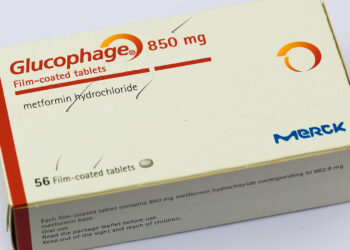TOPLINE:
Isotretinoin was associated with slower growth rates in adolescents with acne but did not affect final adult height compared with antibiotics, a study found.
METHODOLOGY:
- Researchers conducted a retrospective cohort study of 1406 patients with acne vulgaris (41% women; median age, 14.65 years; 85.4% White individuals) between 2005-2021 from the Rochester Epidemiology Project.
- Patients received either isotretinoin for at least 3 months (n = 227) or oral antibiotics (n = 1179) before age 15, matched by sex and age at the time medication was initiated.
- The primary outcome was final height recorded at age 18; secondary outcomes included pre- and post-medication initiation height velocity and change in height velocity.
- Patients in the isotretinoin group received a median cumulative dose of 163.06 mg/kg, with a median treatment duration of 8 months.
TAKEAWAY:
- Among the 179 patients treated with isotretinoin who reached aged 18 by April 30, 2024, final height at age 18 did not differ significantly between those in the isotretinoin and antibiotic groups (173.60 vs 175.54 cm, respectively; P = .392).
- Isotretinoin-treated patients had a significantly lower posttreatment initiation height velocity (0.23 vs 0.34 cm/month; P = .005).
- The decline in height velocity when pre- and post-medication initiation periods was greater in the isotretinoin vs the antibiotics group (average difference, -0.31 cm/month; P = .011).
- No significant differences in final height were observed across isotretinoin dose ranges.
IN PRACTICE:
“While our findings indicate that isotretinoin may be associated with a potential reduction in height velocity among adolescents treated for acne,” the authors wrote, the results “suggest that isotretinoin is unlikely to have a clinically meaningful impact on final adult height in patients treated for acne.” However, they added, “the risk of a potential negative effect on growth should be carefully considered for each individual patient as part of shared decision making.”
SOURCE:
The study was led by Kathryn Xu and Nessa Aghazadeh, MD, Mayo Clinic, Rochester, Minnesota, and was published online on August 14 in the Journal of the American Academy of Dermatology.
LIMITATIONS:
The study was limited by its sample size and potential unmeasured confounding factors. Additionally, the inclusion of predominantly non-Hispanic White individuals could affect the generalizability of the findings to other demographic groups.
DISCLOSURES:
The study received support from the National Institute on Aging, Mayo Clinic, and the National Institutes of Health. One author reported receiving consulting fees from Honeydew Care and Sanofi Pasteur for work unrelated to this study.
This article was created using several editorial tools, including AI, as part of the process. Human editors reviewed this content before publication.
Source link : https://www.medscape.com/viewarticle/temporary-growth-changes-during-isotretinoin-treatment-do-2025a1000luk?src=rss
Author :
Publish date : 2025-08-19 08:16:00
Copyright for syndicated content belongs to the linked Source.












